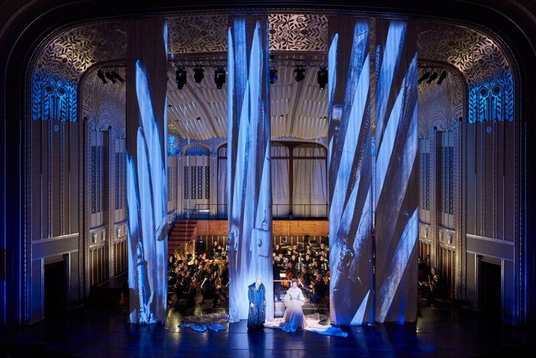Thu 4/7-Sun 4/10
Severance Hall: Site of mayhem, murder and general cynicism about humankind? When the Cleveland Orchestra pairs Miraculous Mandarin and Bluebeard’s Castle by Bela Bartók, that’s what you get. Franz Welser-Möst conducted the Cleveland Orchestra with evident and infectious enthusiasm from his perch between the orchestra and the Joffrey Ballet.
It was a night filled with excellent performances by both. The Joffrey, under the direction of Ashley Wheater, offered spell-binding interpretations of both works. Miraculous Mandarin limns the sad tale of a sexy woman, the graceful Victoria Jaiana, who serves three robber thugs (Raul Casasola, Paulo Rodrigues and Joan Sebastian Zamora). She tempts two hapless men (Miguel Angel Blanco and Temur Suluashvili) to come up to her room where the thugs attack them. But the third man, dynamic Yoshihisa Aral as the title’s mysterious Mandarin, proves tempting to her. It ends badly and he dies, but not before she embraces him with love and pity.
The orchestra blended so seamlessly with the action (in both) that it became as one with the story as it offered clues about how listeners should respond emotionally. In Miraculous Mandarin, the flute, harp, celesta and even the muted, wordless chorus stood out, offering moments of respite before the furious brass and percussion finished off the gloomy pantomime.
But the Miraculous Mandarin was cheery in comparison to Bluebeard’s Castle. Duke Bluebeard, bass Mikhail Petrenko (who also sets the story in motion before assuming his character), has taken a bride, Judith (soprano Katarina Dalayman). The seductive beauty of Petrenko’s voice belies his character’s dangerous aspects. Veils hung from the top of the stage to represent doors (words were projected onto the molding far above the stage and were hard to see), and as Bluebeard shows his new wife around his castle, the veils come down for great dramatic effect.
Judith insists on opening all the doors in the castle to, as she urges, “let a little light in.” Her husband keeps saying, in effect, “Don’t do that. Please, leave it alone.” But she insists he will feel better when they do. The lesson of this opera is, of course, don’t push your husband too far, ladies, if he says “You don’t want to know that,” then maybe you don’t.
When it’s time for the last door to open, Bluebeard strides up a platform at the back of the stage, the organ blasts out in fine and spooky tones, and a blue light illuminates organ pipes that are usually just part of the background. It’s clear that bad things are going to happen. Poor Judith discovers she’s not the only wife. The others (it’s hard to say if they are alive or dead), played by dancers Amanda Assucena, April Daly, and Victoria Jaiani, welcome her as a “sister wife.”
The final scene, with all the women rolling on the floor at the front of the stage, didn’t seem horrible enough — it seemed more of “serves you right” moment. Sometimes it’s best to leave a few things to the imagination. Let the walking dead quietly draw Judith into the darkness.
It’s likely an understatement to say that based on these two works, I don’t think Bartók was a happy man. And I’m rather sure he was uncomfortable with women. However, his music, stitched together in ways unique to his combination of Hungarian melodies and tones offers a distinctive, striking, and musical event.
Bottom Line: The Cleveland Orchestra and the Joffrey Ballet gave us the expected night to remember, one full of drama, great music, beautifully presented pantomime and dance. If you want to keep the horror theme going, then check out the orchestra’s Tue 4/26 feature: At the Movies: Bride of Frankenstein, conducted by Richard Kaufman. For tickets or information go to clevelandorchestra.com.
[Written by Laura Kennelly] [Photo by Roger Mastroianni]Case Western Reserve University, Cleveland, OH 44106
